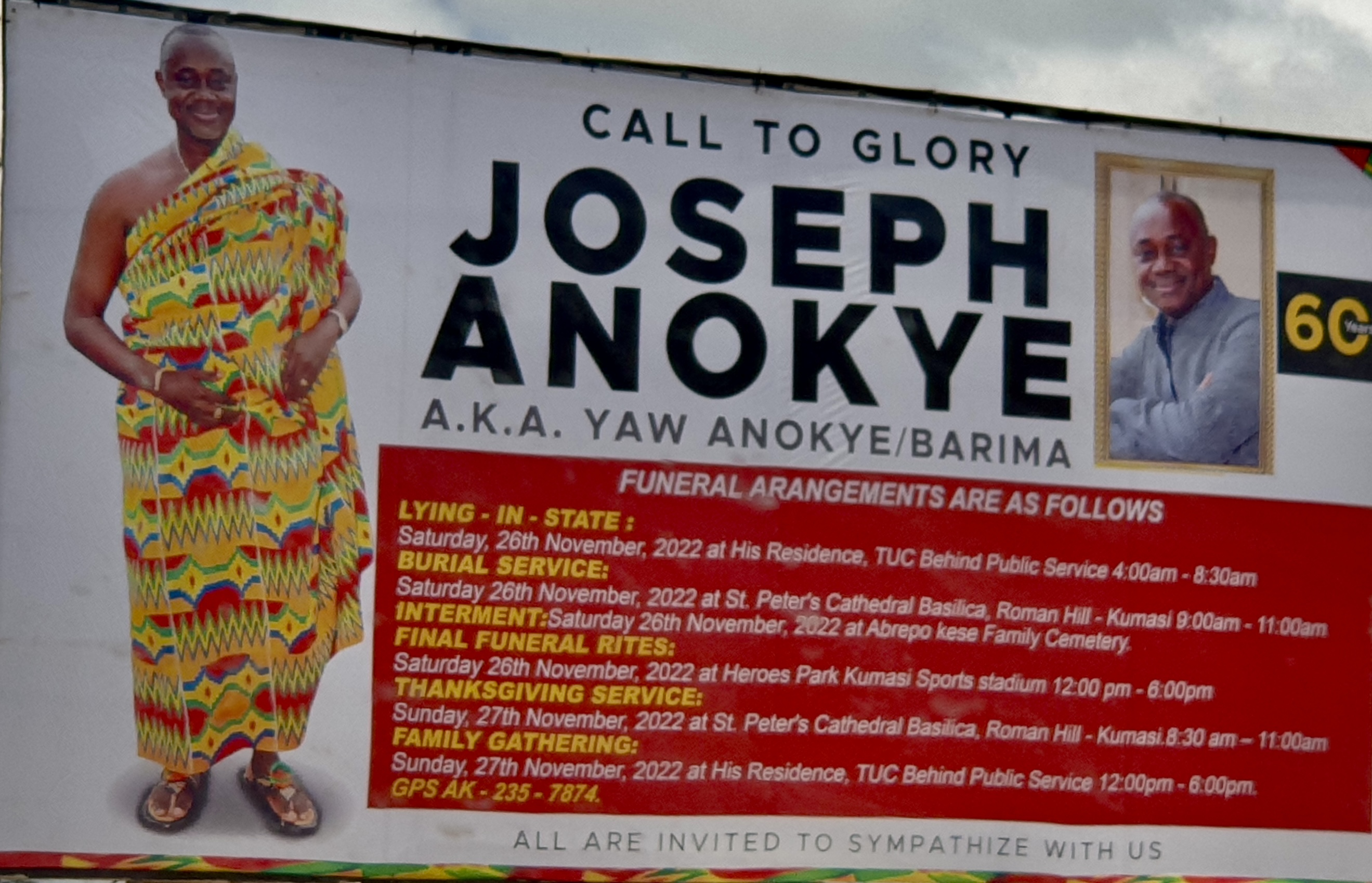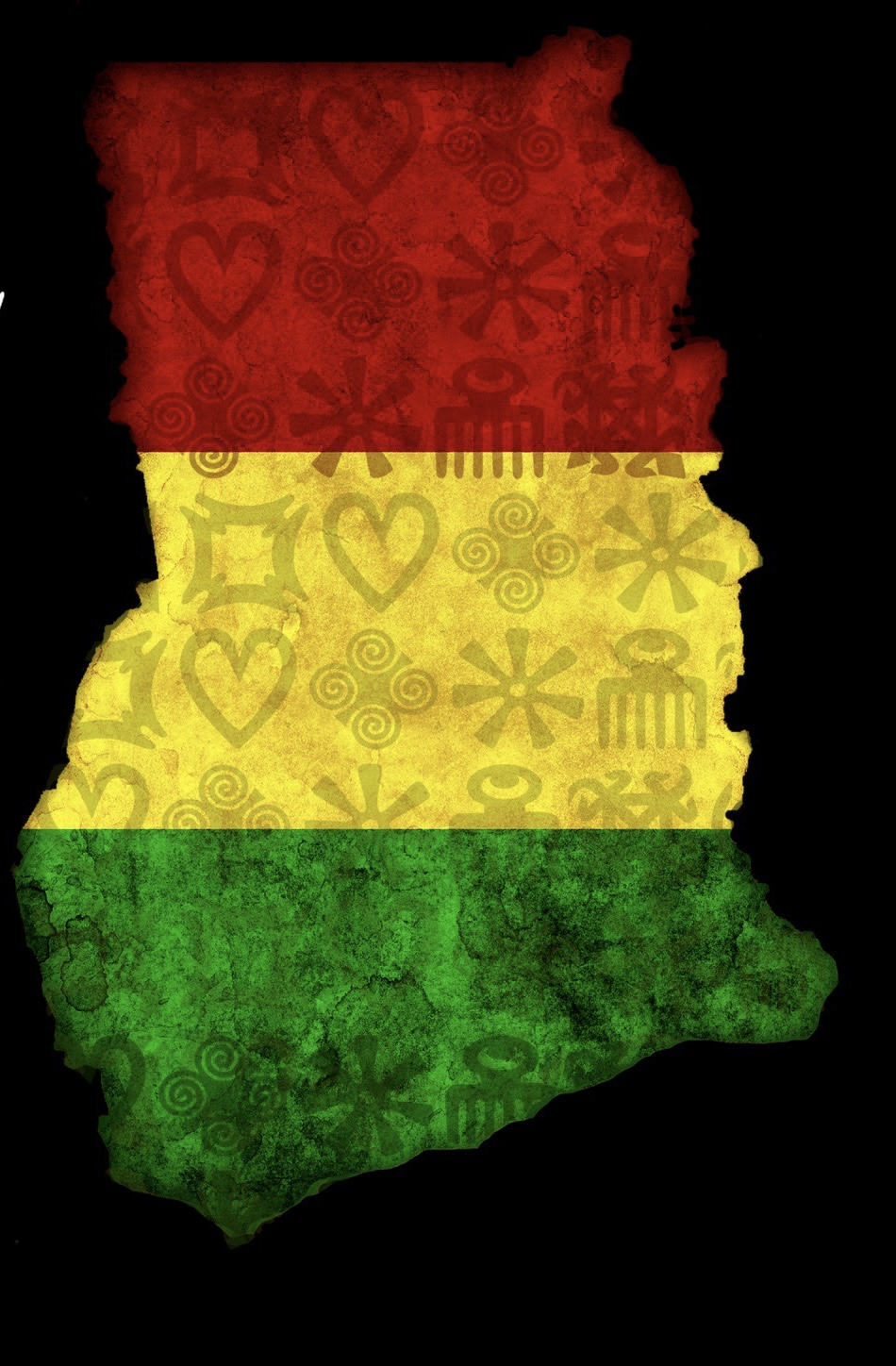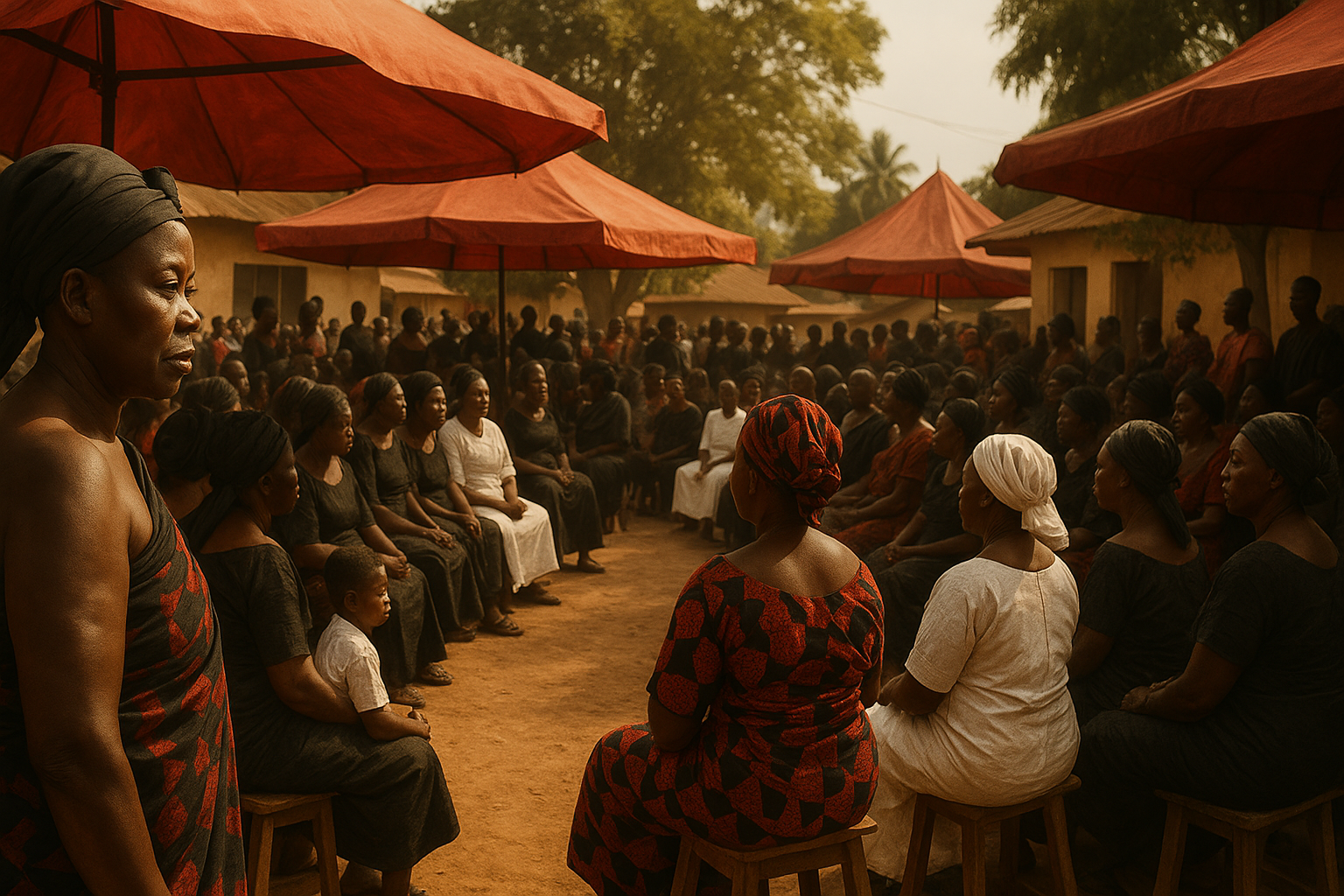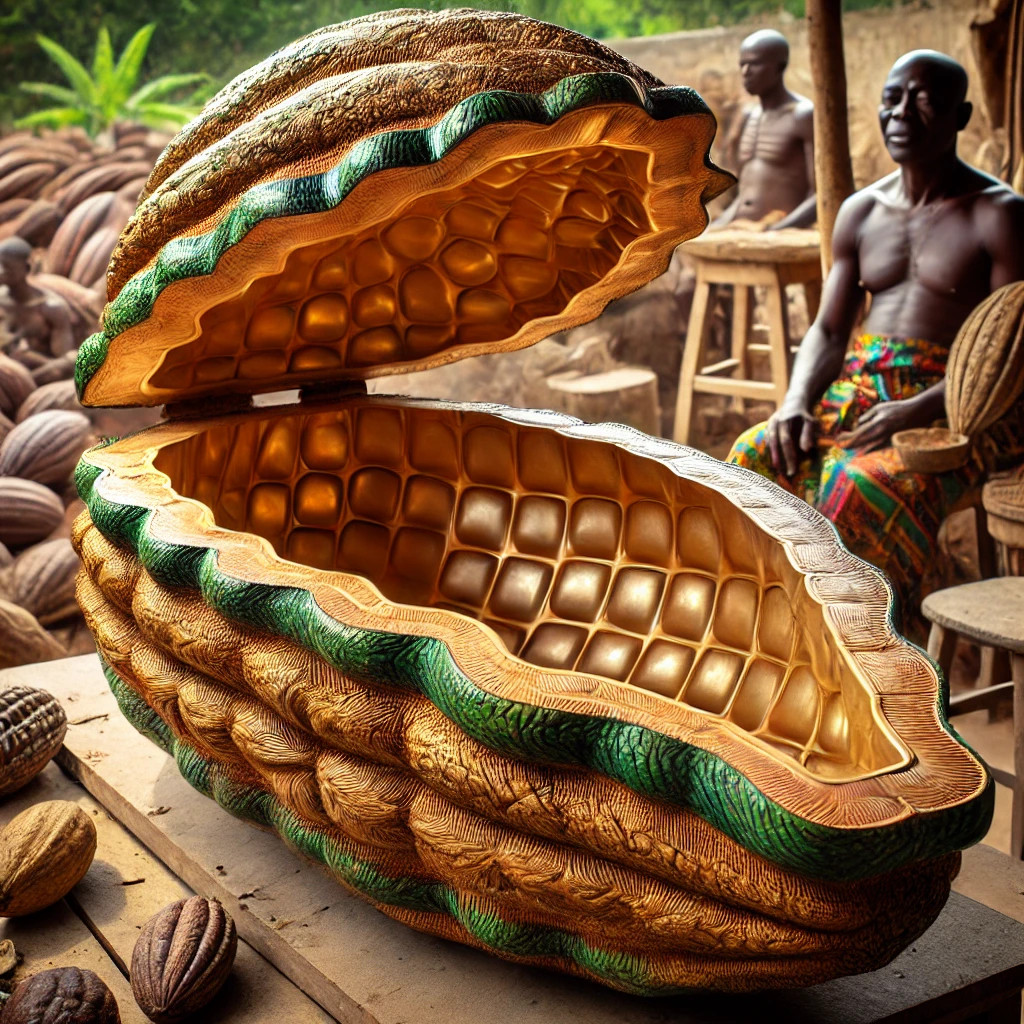
In Ghana, a funeral is not only an ending it is a passage, a reunion, and a reminder that love and memory never truly die.
First Impressions
When you first arrive in Ghana, it’s impossible not to notice the banners, posters, and memorial billboards that line the roadsides, faces of loved ones smil

ing, dignified, and framed in bright colours look out from walls and lamp posts. Funerals are woven into the rhythm of life here.
As I travelled north into the Ashanti region, it became clear that funerals are not rare, somber occasions, but vital community events deeply spiritual, profoundly social, and often spectacular in scale, curious to understand this, as a chaplain who occasionally has to perform funerals i want to know more so I began exploring how Ghanaians view death, mourning, and the eternal bond with their ancestors.
Beliefs About Death and the Afterlife
Across Ghana’s diverse ethnic and religious landscape, one shared belief unites most communities: the dead are never truly gone, ancestors continue to protect and guide the living, and funerals ensure that the deceased is properly welcomed into the ancestral realm.
Modern Ghana is approximately 72% Christian, 17.6% Muslim, and 5.2% adherents of traditional African religions (source: Ghana Statistical Service, 2021) yet traditional spirituality shapes almost every funeral, regardless of faith. Even Christian services may include drumming, libations, or ancestral invocations.
Funerals are not hurried affairs, planning can take weeks or months, allowing families time to gather relatives, raise funds, and prepare ceremonies that honour both earthly life and eternal legacy.
The Multi-Stage Ghanaian Funeral
A typical Ghanaian funeral unfolds in several stages:
Announcement and Preparation Family meetings are held to agree on arrangements and costs.
Public banners announce the death, inviting the community to attend.
The One-Week Celebration Held seven days after death, this gathering allows mourners to pay early respects and begin collective grieving.
The Funeral and Burial Usually on a Saturday, this is the main even marked by processions, drumming, dancing, and shared meals.
Thanksgiving or Memorial Services Often held the following Sunday or on anniversaries, blending church worship with continued remembrance.
Each stage balances mourning and celebration, ritual and reunion.
 Ashanti Funerals: The Dance Between Grief and Gratitude
Ashanti Funerals: The Dance Between Grief and Gratitude
Among the Ashanti people, funerals (called ayie) are monumental affairs, they honour the deceased’s transition into the ancestral world sometimes referred to as ɔkra, the immortal soul.
Family members take part in preparing the body, while chiefs and elders preside beneath ornate umbrellas, signifying the unity between the living and the ancestral spirits.
The ceremonies can stretch over several days, traditional fontomfrom and talking drums echo through the air, each rhythm carrying a message some recounting the deeds of the departed, others guiding their spirit home.
Colour is everywhere:
Black and white for most attendees, expressing gratitude and respect.
Red and black for the immediate family, symbolising intense grief and kinship.
Gold embroidery and kente may adorn chiefs or elders, signifying status and tradition.
For the Ashanti, a funeral is as much about community cohesion as commemoration. It reaffirms belonging between families, ancestors, and the land itself.
Music and Drums: The Voices of the Ancestors
The drum in Ghana is not merely an instrument it is a storyteller.
Talking drums, when played by skilled hands, can imitate speech tones from Twi or Ga, “speaking” messages about the deceased’s virtues and lineage.
During a funeral procession, these rhythms create a living dialogue between the living and the dead. They can praise, mourn, and even advise. The music becomes both eulogy and benediction.
Symbols, Colours, and Ritual Details
Funeral attire in Ghana is full of meaning.
Black and white: transition, peace, and divine gratitude.
Red and black: deep mourning and familial loss.
Net caps, peppers, and eggshells worn by sons of the deceased convey complex emotions heat and anguish (red peppers), fragility and rebirth (eggshells), and the climb between worlds (miniature ladders).
Every gesture, colour, and fabric carries a story.
The One-Week and Annual Memorials
Saturdays are traditional funeral days, and it’s common for several ceremonies to take place in one town on the same weekend.
A week after death, families gather for a one-week celebration less elaborate than the main funeral but vital for beginning the healing process. Later anniversaries, including one-year memorials, are equally important moments of remembrance.
These repeated acts of honour ensure that ancestors remain woven into everyday family life.

Fantasy Coffins: Where Art Meets Eternity
One of Ghana’s most distinctive funerary traditions is the “fantasy coffin” an elaborately carved, custom-made coffin reflecting the profession, passion, or spirit of the deceased.
fisherman may rest in a coffin shaped like a fish.
A pilot may soar eternally in a carved airplane.
A cocoa farmer might choose a cocoa pod coffin my personal favourite!Originating among the Ga people of coastal Accra in the 1950s, these coffins (abebuu-adee, meaning “proverb boxes”) are now world-renowned they are works of art, but also profound expressions of identity, status, and story.
“To die is to travel home; to travel home is to tell your story once more.” Ga proverb
Funeral Etiquette for Visitors
If you are invited to a Ghanaian funeral, consider it an honour, these events are open, communal, and generous, yet they carry deep protocol.
Dress Code:
Guests usually wear black and white.
Close family members wear red and black.
Avoid bright or casual colours unless advised otherwise.
Gifts and Donations:
Funerals are expensive. It is respectful to contribute financially, offer drinks, or bring a small token of sympathy always ask the family or organisers what is appropriate.
Tone and Behaviour:
Expect moments of both grief and joy, tears may give way to dancing, hymns to highlife music. Participate respectfully, following the family’s lead, and always greet elders first.
The Ongoing Relationship with Ancestors
Mourning in Ghana does not end at burial. Ancestors are ever-present guardians, protectors, and members of the household. Families pour libations, tell stories, and gather to remember.
This continuity between life and death is what makes Ghanaian funerals extraordinary, they transform loss into legacy and grief into gratitude.
Reflections
To witness or take part in a Ghanaian funeral is to glimpse a worldview where community transcends mortality.
It is a reminder that to live well is to be remembered well and that remembrance itself is a sacred act of love.
